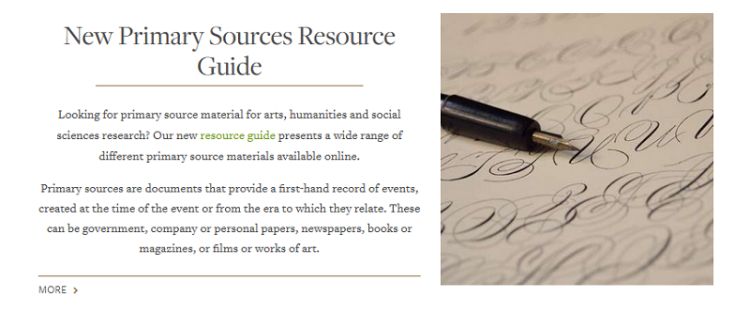Annual report 2019-20
Research impact

On this page:
- Open research
- Research visibility
- Dialect and Heritage Project bid success
- Timescapes: using research data in teaching
- Digital humanities and primary sources
Open research
Our Research Support Team runs a webinar on the benefits of open research and has worked closely with faculties to better understand disciplinary differences and local priorities. The Library promotes an inclusive research culture through open research practices and principles.
Open research extends the familiar principles of open access publications and data to the entire research process. Open research could include results, software and code, methodology, protocols and documentation, as well as publications and data. There are many benefits for researchers including enhanced transparency and reproducibility, long term preservation, faster and broader dissemination, and increased research visibility. Funders including UKRI and Wellcome recognise the value of open research and both have policies emphasising open research practices.
Research visibility
High quality research needs to be easy to find so that it attracts the attention it deserves.
We are involved in a range of related initiatives to increase research visibility:
- ORCIDs are now a requirement for all research staff and students. These unique author identifiers make sure that research outputs are correctly and consistently attributed.
- We continue to work with the DVC International and Pro Deans for Research and Innovation to better understand the role that citations play in university rankings.
- Our bibliometric service helps to identify areas where research visibility could be increased. A wide range of faculties and schools benefit from our analysis and insight, which gives a better understanding of effective strategies and new opportunities for increasing visibility, such as potential collaborations.
- We have removed barriers to research under temporary embargo through expansion of the “Request a copy” feature in White Rose Research Online, the institutional repository. Researchers can now request copies from Leeds authors, increasing the reach of the author’s research.
- We are developing support around how to practise responsible metrics when using and applying citation data, after the University signed up to DORA, the Declaration on Research Assessment.
- When we were able to welcome delegates to campus, we were delighted to host the LIS-Bibliometrics international conference on The Future of Research Evaluation.
Dialect and Heritage Project bid success

New funding means that we can enhance our metadata and digitise items to open up the Leeds Archive of Vernacular Culture (LAVC) collection, which will enable new connections with museum collections across the country.
In autumn 2019 the School of English, under the leadership of Dr Fiona Douglas, received significant funding from the National Lottery Heritage Fund to work with Special Collections and five rural museums across England.
The award is the result of an intensive 12-month programme of development with all partners. This provided evidence for the potential of the LAVC to be a major resource for the heritage sector, built relationships with disadvantaged communities, and scoped new dialect research.
The programme is linked to another major National Lottery Heritage Project, Save Our Sounds, led by the British Library. The British Library have taken responsibility for the physical preservation of our LAVC audio recordings and are making them digitally accessible.
These major collaborative projects bring renewed life into research data generated in the 1950s–1980s. The content of this collection supports research and engagement across many subject areas. We expect this work to place the Leeds Archive of Vernacular Culture as a central resource for further collaborative activity.
Timescapes: using research data in teaching
Our Research Data Management Service runs the Timescapes Data Archive. The archive is a specialist resource of qualitative longitudinal research datasets themed around the real-life experiences, accounts and reflections of people going about “the everyday”, spanning all aspects of their lives.
To promote the wider benefits of archived research data, we created teaching material focussed on the rich and themed datasets hosted by the archive. Our Timescapes for Teaching initiative for classroom and online teaching supports tutors, students and groups to access archived data for educational or research purposes.
Timescapes case study: Big Qual Analysis
The archive is now embedded into teaching practice as part of a National Centre for Research Methods (NCRM) training programme targeted at social scientists.
Led by NCRM researchers and Kahryn Hughes from our School of Social Sciences, researchers from the Universities of Southampton and Edinburgh are using the Timescapes Data Archive to host a specialist teaching dataset for analysing qualitative data called Big Qual Analysis: the Breadth-and-depth Method.
This allows learners to gain hands-on experience of using a real archive to search, access, and organise qualitative data. The Big Qual methodology can also be applied to archival research, social media research, secondary analysis and other areas of research practice.
Digital humanities and primary sources
Online primary sources
Arts and Humanities students and researchers, heavily reliant on the Library’s collections of printed primary source material, were particularly affected by the campus closure, which placed all print material out of reach.
Working closely with suppliers, we identified gaps in our online provision and bought additional resources to meet the needs of those working on final year undergraduate dissertations.
A new Primary sources resource guide brings together more than 80 resources containing hundreds of thousands of pages of online primary source material, including digital versions of contemporaneous books, magazines, diaries, archives, personal papers, government and official publications, organisational records and newspapers.

Digital scholarship
We are actively seeking opportunities to support digital scholarship at Leeds, particularly in relation to digital humanities. Of note is our subscription to Gale digital scholar lab, a state-of-the-art text mining and text analysis research tool.
The Lab enables analysis of stylistic nuances, word frequency and other patterns within texts. For example, this can help find traits which may point to contextual purpose or bias in the text, or how the reader’s interpretation is influenced.
We have delivered two workshops for academics and students on how to make best use of the Digital Scholar Lab.

